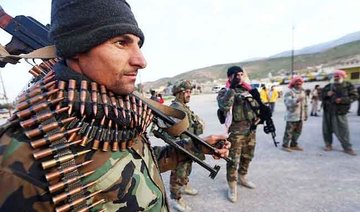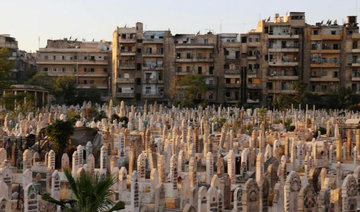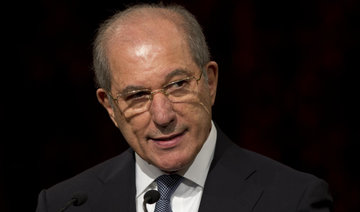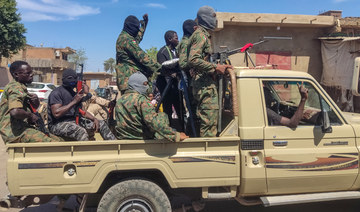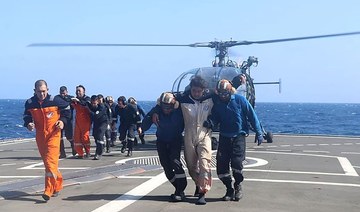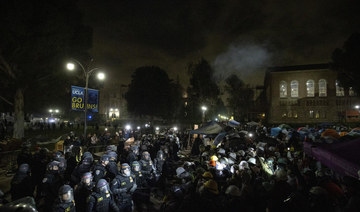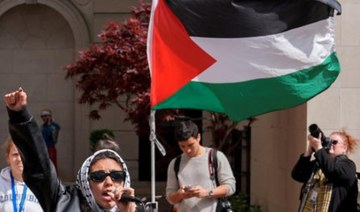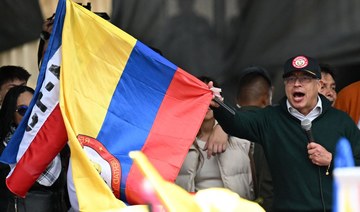BEIRUT: Syria’s long-running civil war may be winding down slowly, but the country is awash in weapons and a confounding array of local militias and thousands of foreign troops, some of which may never leave.
With crucial aid from allies Iran and Russia, President Bashar Assad has regained control over large areas of Syria in advances that appear to have put to rest the possibility of a military overthrow, at least for now. But his rule is extremely reliant on continued assistance from Iranian-sponsored militias, which have spread across the war-ravaged country.
The fight against the Daesh group, which proliferated soon after the conflict began in 2011, has provided a convenient justification for foreign troops to be deployed in Syria with the pretext of fighting the extremists. Now that Daesh no longer holds any significant urban territory in Syria, the numbers of some forces may be scaled down, but foreign powers with longer-term ambitions and interests will try to maintain a presence in the country for years to come. That will further complicate prospects for a peace settlement.
Some countries have already indicated that they plan to stay for the foreseeable future.
The Americans
The presence of US troops in northern Syria was initially meant to help train and support Kurdish-dominated local forces fighting the Daesh group.
The number of troops has grown gradually. Although the official limit on US troops has remained at 503 since shortly before President Barack Obama left office, the actual number is now believed to be more than 1,500, including special forces, a Marine artillery unit, forward air controllers and others. They are spread across more than a dozen bases in northern Syria.
The end of the fight against Daesh takes away any legal justification for the presence of US troops in Syria, but US officials are now suggesting they plan to maintain a US troop presence in the north until an overall settlement for the war is found. That has raised concern about a more permanent project that risks drawing the US into a conflict with Syria and Assad’s ally, Iran.
“We’re not just going to walk away right now before the Geneva process has cracked,” US Secretary of Defense Jim Mattis said earlier this month, referring to the UN-backed political talks.
Kurdish officials have asked the US to stay on, fearing that a quick withdrawal would facilitate Assad’s forces swooping in on Kurdish-held territory in the north.
Earlier this month, the Syrian government called on the United States to withdraw its forces now that the fight against the Daesh group is nearly over. The Foreign Ministry statement said the presence of US troops will not force a political solution to the conflict.
The Russians
Russia has never said how many of its military personnel, warplanes and other weapons are in Syria. Turnout figures in voting from abroad in the September 2016 parliamentary election indicated the number of Russian military personnel in Syria at the time was about 4,300. The Russian presence has likely increased, as Moscow this year deployed its military police to patrol so-called “de-escalation zones” in Syria.
Open-source materials — including video from the Hemeimeem air base, the main hub for the Russian military in Syria since its campaign began in September 2015 — indicate that Russia has several dozen jets and helicopter gunships there.
Russia also has deployed special forces to conduct intelligence and coordinate airstrikes. Senior Russian military officers also have helped train and direct Syrian government troops. In recent months, Russian military police have become increasingly visible in Syria.
The chief of the Russian military general staff, Gen. Valery Gerasimov, said last week that Russia will “significantly” reduce its military foothold in Syria as the campaign nears its end.
At the same time, he indicated Russia will maintain a presence at both the Hemeimeem air base and the navy supply facility in Tartus. Gerasimov added that the military’s Reconciliation Center, a group of officers who have helped negotiate and maintain truces in Syria and coordinated the delivery of humanitarian aid, also will stay.
Syria has allowed Russia to use Hemeimeem air base indefinitely without cost. Moscow also has signed a deal with Syria to use the Tartus base for 49 years, which could be extended if both parties agree.
The Russian military plans to modernize the air base to allow it to host more warplanes. It also intends to expand the Tartus facility significantly to make it a full-scale naval base capable of hosting warships, including cruiser-sized vessels.
The Iranians and sponsored militias
Of all the foreign troops in Syria, perhaps none have been as widespread and potentially lasting as the Iranians. The Islamic Republic of Iran has made an enormous effort to keep Assad in power, providing extensive military and financial support throughout the six-year civil war.
It has deployed Islamic Revolutionary Guards in Syria as well as Iranian officers who provide military and political support. Iranian officials say more than 1,000 Iranian fighters have been killed in Syria and Iraq after they were deployed to defend Shiite holy shrines.
Tens of thousands of Iranian-sponsored pro-government local militias known as the National Defense Forces are deployed across Syria, in addition to Iraqi Shiite militias and thousands of Iranian-backed Hezbollah fighters from Lebanon who have been key factors in turning the war in the government’s favor. Hezbollah is deployed in wide areas along Syria’s border with Lebanon, where the Shiite group has built military facilities and long-term bases it is unlikely to leave anytime soon.
Iran’s strategy aims to ensure it can continue to pursue its vital interests after the war, using parts of Syria as a base and making certain that a land corridor from Tehran to Beirut remains open.
The Turks
Turkey first sent ground forces into Syria last year in a campaign dubbed “Operation Euphrates Shield.” It was aimed at fighting the Daesh group, although Turkey also seeks, above all, to limit the expansion of Syria’s Kurds along its border with Syria. Ankara perceives the Syrian Kurdish fighters to be an extension of the Kurdish insurgents who have waged a three- decade insurgency in Turkey.
Turkish officials have not disclosed how many Turkish soldiers are deployed in Syria but security experts estimate that at least 2,500 troops are stationed in a swath of territory revolving around the towns of Al-Rai, Al-Bab and Jarablus — a border zone that Turkey and Turkey-backed rebels took back from IS last year under “Euphrates Shield.”
An estimated 400 more Turkish troops are in the Idlib region as part of an agreement reached among Turkey, Russia and Iran to create a “de-escalation zone” in the area.
Turkey is building schools and hospitals in areas liberated under “Euphrates Shield” to encourage the return of refugees, and it was unclear how long the Turkish troops would stay in the zone.
President Recep Tayyip Erdogan has suggested that the Turkish troops could target a Syrian Kurdish group that Turkey considers to be a security threat in the Afrin region, north of Idlib, once the “de-escalation” mission is over.
Thousands of foreign troops in Syria: but will they leave?
Thousands of foreign troops in Syria: but will they leave?
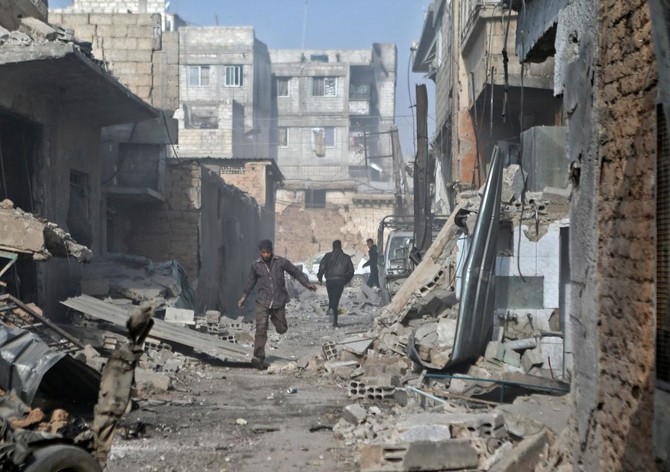
Lebanon urged to conclude working arrangement with EU border agency Frontex to prevent illegal migration
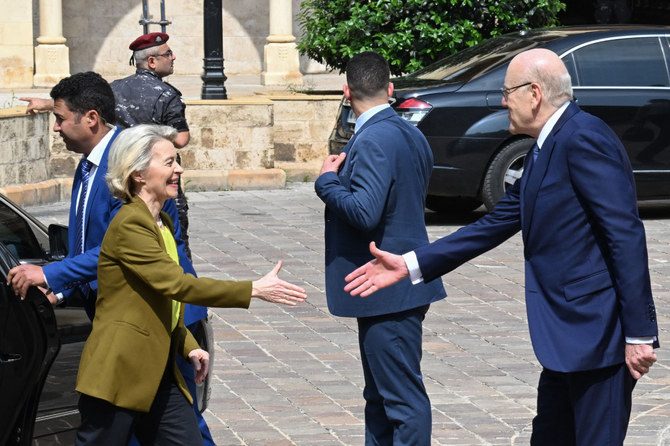
- Berri: Lebanon ready to discuss implementation of UN Resolution 1701 after Gaza aggression ends
- The EU assistance is tied to Lebanon’s need to implement the required reforms and control its borders and illegal crossings with Syria
BEIRUT: The EU has announced an aid package for Lebanon of1 billion euros ($1.06 billion) to help boost border control and halt the flow of asylum-seekers and migrants from the country across the Mediterranean Sea to Cyprus and Italy.
It comes against a backdrop of increasing hostility toward Syrian refugees in Lebanon and a major surge in irregular migration of Syrians from Lebanon to Cyprus.
The UN High Commissioner for Refugees, meanwhile, has decided to reduce healthcare coverage for registered Syrian refugees by 50 percent.
EU Commission President Ursula von der Leyen said during her visit to Beirut with Cypriot President Nikos Christodoulides that they hoped Lebanon would conclude a “working arrangement” with Frontex, the EU’s border agency.
Von der Leyen said the aid’s distribution will start this year and continue until 2027.
The aid will be dedicated to the most vulnerable people, including refugees, internally displaced people, and host communities.
The EU assistance — which is tied to Lebanon’s need to implement the required reforms and control its borders and illegal crossings with Syria — came in the wake of continued hostilities on the southern front between Hezbollah and the Israeli military.
The two officials arrived in Beirut following the European Council’s special meeting last month.
At the end of the meeting, the council confirmed the EU’s “determination to support the most vulnerable people in Lebanon, strengthen its support to the Lebanese Armed Forces, and combat human trafficking and smuggling.”
It also reaffirmed “the need to achieve conditions for safe, voluntary and dignified return of Syrian refugees, as defined by UNHCR.”
The visit lasted hours in Lebanon and included a meeting with caretaker Prime Minister Najib Mikati and Parliament Speaker Nabih Berri.
Following a tripartite meeting and an expanded discussion in which ministers and security officials participated, Mikati commended the EU’s understanding of the Lebanese state’s demand to reconsider some of its policies regarding assistance to Syrian refugees in the country.
Mikati said: “Lebanon has borne the greatest burden, but it can no longer endure the current situation, especially since the refugees constitute around one-third of Lebanon’s population, which results in additional difficulties and challenges and exacerbates Lebanon’s economic crisis.”
He added: “What is more dangerous is the escalating tension between Syrian refugees and the Lebanese host community due to the crimes that are increasing and threatening national security.”
Mikati emphasized that “Lebanon’s security is security for European countries and vice versa,” adding that “our cooperation on this matter constitutes the real entry point for stability.”
He added: “We refuse to let our country become an alternative homeland, and everyone knows that the solution is political excellence.”
Mikati called for the EU and international actors to recognize that most Syrian areas have become safe, which would facilitate the refugees’ repatriation and allow them to be supported in their home country.
As a first step, those who entered Lebanon in 2016 must go back, as most of them fled for economic reasons and are not considered refugees, said Mikati.
He warned against “turning Lebanon into a transit country to Europe,” saying that “the problems occurring on the Cypriot border are a sample of what might happen if the matter was not radically addressed.”
Von der Leyen, the first European Commission president to visit Lebanon, affirmed her “understanding of the Lebanese position.”
She said: “We want to contribute to Lebanon’s socio-economic stability by strengthening basic services and investments in, for example, education, social protection, and health for the people of Lebanon.
“We will accompany you as you take forward economic, financial, and banking reforms.
“These reforms are key to improving the country’s long-term economic situation. This would allow the business environment and the banking sector to regain the international community’s trust and thus enable private sector investment.”
The EU official said that the support program for the Lebanese military and other security forces “will mainly focus on providing equipment, training and the necessary infrastructure for border management.
“In addition, it would be very helpful for Lebanon to conclude a working arrangement with Frontex, particularly on information exchange and situational awareness.”
She continued: “To help you manage migration, we are committed to maintaining legal pathways open to Europe and resettling refugees from Lebanon to the EU.
“At the same time, we count on your cooperation to prevent illegal migration and combat migrant smuggling.”
Von der Leyen said: “We will also look at how we can make the EU’s assistance more effective. This includes exploring how to work on a more structured approach to voluntary returns to Syria, in close cooperation with UNHCR.”
She also stressed that the international community should strengthen support for humanitarian and early recovery programs in Syria.
Von der Leyen added: “We are deeply concerned about the volatile situation in southern Lebanon, and believe that the security of both Lebanon and Israel cannot be disassociated.
“So, we call for the full implementation of UN Security Council Resolution 1701.
“This needs to be part of a negotiated diplomatic settlement. The Lebanese armed forces are critical here, too, and the EU is ready to work on bolstering their capabilities.”
Christodoulides said that European assistance, which also includes “combating smuggling and managing borders and monitoring them,“ would “enhance the Lebanese authorities’ ability to confront various challenges such as monitoring land and sea borders, ensuring the safety of citizens, combating human trafficking, and continuing counterterrorism efforts.”
The Cypriot president said the “reverberations of the issues and challenges” that Lebanon was facing directly affected Cyprus and the EU.
“We need to work with our partners and UNHCR to discuss the issue of voluntary returns and reconsider the situation of some areas in Syria.”
He emphasized that Lebanon must implement the “necessary and deep reforms in line with the International Monetary Fund’s demands and address issues of accountability, and Cyprus will support Lebanon’s efforts to elect a new president, a development that will send a strong political and symbolic message for change and moving forward.”
Parliament Speaker Berri told the European official that Lebanon “does not want war, and since the moment the Israeli aggression began, it has remained committed to the rules of engagement, which Israel continues to violate, targeting the depth of Lebanon, not sparing civilians, media personnel, agricultural areas, and ambulances, using internationally banned weapons.”
Berri said that Lebanon, “while awaiting the success of international efforts to stop the aggression on the Gaza Strip, which will inevitably reflect on Lebanon and the region, will then be ready to continue the discussion on the implementation of UN Resolution 1701, to which Lebanon was and still is committed and adheres.”
Berri urged “the concerned parties to engage with the Syrian government, which now has a presence over most of its territories, in addressing the refugee issue.”
Red Cross says gunmen kill two of its drivers in Sudan
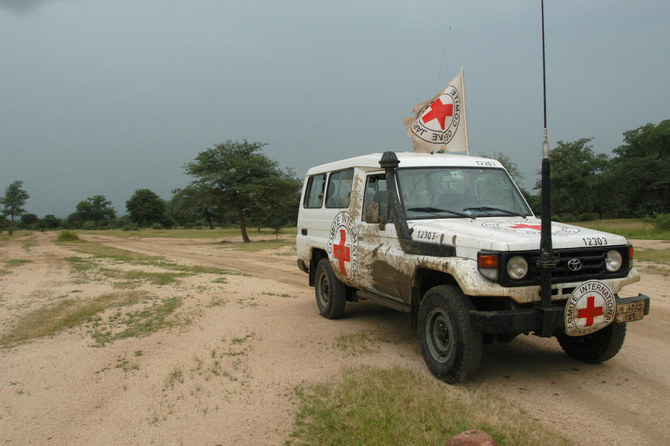
- The team was on its way back from Layba to assess the humanitarian situation of communities affected by armed violence
- “We are in deep mourning for our dear colleagues,” said Pierre Dorbes, head of the ICRC delegation in Sudan
GEENVA: Gunmen killed two drivers working for the International Committee of the Red Cross in war-torn Sudan on Thursday and injured three other staff, the ICRC said.
“The team was on its way back from Layba to assess the humanitarian situation of communities affected by armed violence in the region when the incident occurred” in South Darfur, the ICRC said in a statement.
“We are in deep mourning for our dear colleagues. We extend our sincere condolences to their families, and we hope for a speedy recovery for our injured co-workers,” said Pierre Dorbes, head of the ICRC delegation in Sudan.
A brutal conflict between the Sudanese army led by General Abdel Fattah Al-Burhan and the paramilitary Rapid Support Forces of his ex-deputy Mohamed Hamdan Dagalo has torn the country apart for more than a year.
The war has killed tens of thousands of people and forced millions more to flee their homes in what the United Nations has called the “largest displacement crisis in the world.”
It has also triggered acute food shortages and a humanitarian crisis that has left the northeast African country’s people at risk of starvation.
Houthi leader vows ‘fourth phase’ of Red Sea ship attacks
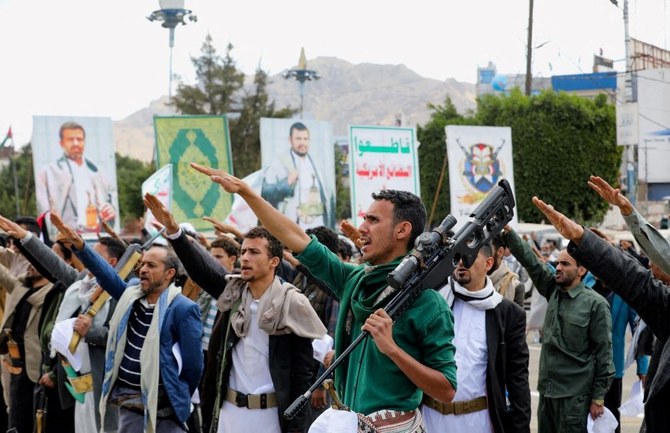
- Abdul Malik Al-Houthi: ‘We are preparing for a fourth round of escalation if the Israeli enemy and the Americans continue their intransigence’
- Al-Houthi said that 452 attacks by US and UK armies on militia-controlled regions had killed 40 people and injured 35 others since January
AL-MUKALLA: The leader of the Houthi militia vowed to escalate attacks on ships in the Red Sea until Israel ends its war in Gaza and the US stops attacking Yemen.
“We are preparing for a fourth round of escalation if the Israeli enemy and the Americans continue their intransigence,” Abdul Malik Al-Houthi said in a televised speech on Thursday.
Al-Houthi said that his forces launched 606 ballistic missiles and drones against 107 Israeli, US, and UK ships in the Red Sea, Bab Al-Mandab Strait, Gulf of Aden, and recently in the Indian Ocean during the Red Sea ship campaign that began in November.
In the last seven days alone, the Houthis have fired 33 ballistic missiles and drones at six ships in international seas off Yemen’s coast, as well as Israel’s city of Eilat.
Al-Houthi said that 452 attacks by US and UK armies on militia-controlled regions had killed 40 people and injured 35 others since January.
His warning came after the militia’s media said on Thursday that the US and UK carried out five airstrikes on Hodeidah airport in the Red Sea’s western city of Hodeidah.
On Tuesday, the US carried out another strike on the port of Al-Saleef in Hodeidah after the US Central Command reported its troops stopped a Houthi assault with a drone boat on the same day.
The Houthis have seized a commercial ship, sunk another, and launched hundreds of missiles and drones at international navy and commercial ships in the Red Sea since November, claiming to be in support of Palestinians and pressuring Israel to cease its war in Gaza.
As a response to the attacks, the US formed a coalition of marine forces to protect the Red Sea.
It also launched strikes on Houthi targets in Sanaa, Saada, Hodeidah, and other Yemeni areas controlled by the Houthis.
Turkiye’s Erdogan criticizes US crackdown on college protests
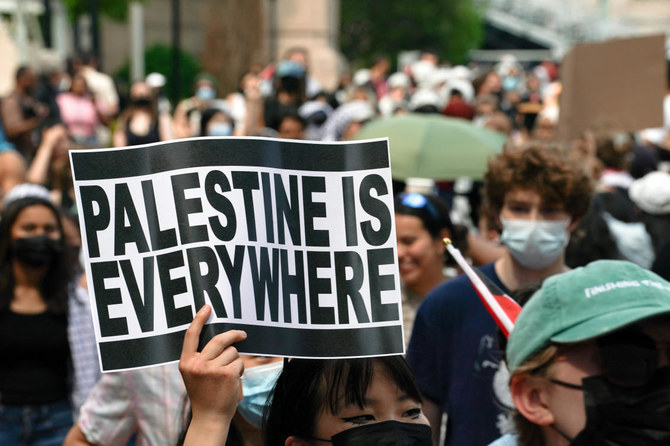
- “Conscientious students and academics including anti-Zionist Jews at some prestigious American universities are protesting the massacre (in Gaza),” Erdogan told an event
- “These people are being subjected to violence, cruelty, suffering, and even torture for saying the massacre has to stop“
ANKARA: Turkish President Tayyip Erdogan waded into the debate over US college campus protests on Thursday, saying authorities were displaying “cruelty” in clamping down on pro-Palestinian students and academics.
Demonstrations have spread on campuses across the United States over Israel’s conduct of the war in Gaza, prompting police crackdowns and arrests at some venues such as Columbia University in New York.
“Conscientious students and academics including anti-Zionist Jews at some prestigious American universities are protesting the massacre (in Gaza),” Erdogan told an event in Ankara.
“These people are being subjected to violence, cruelty, suffering, and even torture for saying the massacre has to stop,” he said, adding that university staff were being “sacked and lynched” for supporting the Palestinians.
Turkiye, a NATO ally of the United States, has sharply criticized Israel’s assault on Gaza and what it calls the unconditional support it receives from Western countries.
The US is a top supplier of military aid to Israel and has shielded the country from critical United Nations votes.
“The limits of Western democracy are drawn by Israel’s interests,” Erdogan said. “Whatever infringes on Israel’s interests is anti-democratic, antisemitic for them.”
More than 34,000 people have been killed in Gaza during Israel’s nearly seven-month military offensive, Palestinian health officials say, after Hamas militants killed some 1,200 people and took 253 hostages during an Oct. 7 assault on southern Israel, according to Israeli tallies.
Israel president says US universities ‘contaminated by hatred, anti-Semitism’

- “We see prominent academic institutions, halls of history, culture, and education contaminated by hatred and anti-Semitism fueled by arrogance and ignorance,” he said
- “We watch in horror as the atrocities of October 7th against Israel are celebrated and justified“
JERUSALEM: Israel’s president on Thursday slammed US universities for campus unrest over Israel’s war in Gaza, saying these institutions were “contaminated by hatred and anti-Semitism.”
Isaac Herzog said in a special broadcast that he was issuing an urgent message of support to Jewish communities amid a “dramatic resurgence in anti-Semitism and following the hostilities and intimidation against Jewish students on campuses across the US in particular.”
“We see prominent academic institutions, halls of history, culture, and education contaminated by hatred and anti-Semitism fueled by arrogance and ignorance,” he said.
“We watch in horror as the atrocities of October 7th against Israel are celebrated and justified.”
His comments came as hundreds of police and protesters were in a tense stand-off at the University of California, Los Angeles and unrest over Israel’s war against Hamas in Gaza continued to spread in campuses across the United States.
Demonstrators have gathered in at least 30 US universities since last month, often erecting tent encampments to protest the soaring death toll in the Gaza Strip.
Israel’s offensive in Gaza has killed at least 34,596 people in Gaza, mostly women and children, according to the Hamas-run territory’s health ministry.
It comes in response to Hamas’s unprecedented attack on Israel on October 7, which resulted in the deaths of 1,170 people, mostly civilians, according to an AFP tally of Israeli official figures.
The militants also took about 250 hostages, 129 of whom remain in Gaza, including 34 presumed dead, Israel says.
The protests against the war have posed a challenge to US university administrators trying to balance free speech rights with allegations of criminal activity, anti-Semitism and hate speech.
In his statement Thursday, Herzog said his message was addressed “to our friends on campuses and in Jewish communities across the United States and all over the world.”
“The people of Israel are with you. We hear you. We see the shameless hostility and threats. We feel the insult, the breach of faith and breach of friendship. We share the apprehension and concern,” he said.
“In the face of violence, harassment and intimidation, as masked cowards smash windows and barricade doors, as they assault the truth and manipulate history, together we stand strong,” he said.
“As they chant for intifada and genocide, we will work — together — to free our hostages held by Hamas, and fight for civil liberties and our right to believe and belong, for the right to live proudly, peacefully and securely, as Jews, as Israelis — anywhere.”
Pointing to Holocaust Memorial Day commemorations next week, the Israeli president said “we will speak of the dark times of the past, and we will remember the miracle of our rebirth.”
“Together, we shall overcome,” he said. “In the face of this terrifying resurgence of anti-Semitism: Do not fear. Stand proud. Stand strong for your freedom.”


